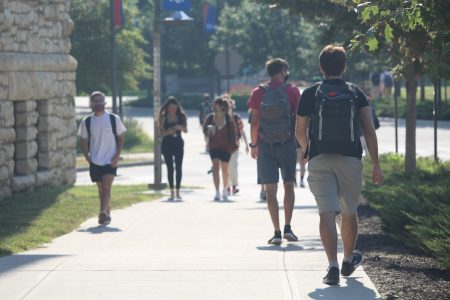Positive COVID-19 cases at KU increase to 222; community still testing positive at just over 1%

photo by: Journal-World File
Students walk along Jayhawk Boulevard, donning masks, on the University of Kansas campus on Aug. 24, 2020.
Story updated at 5:47 p.m. Tuesday:
In its second release of data from initial COVID-19 testing, the University of Kansas announced Tuesday that 222 people in the university community have tested positive for the respiratory virus.
KU Chancellor Douglas Girod announced the update in a campus message Tuesday afternoon and said that the 222 positive results were out of 19,452 total entry tests — a positive rate of 1.14%.
That suggests, Girod said, that KU is starting the semester — which began Monday — in a good place.
“While we may have fewer people than usual on Mount Oread this fall, it’s still good to see classes starting up again,” Girod said. “To all of you who have worked so hard to enable us to reopen campus while continuing to prioritize health and safety — thank you.”
As of 10 p.m. Monday, 15,367 students had received their test results, with 216 of those students testing positive — up from 87 as of 3 p.m. last Wednesday. Faculty and staff members at KU continue to test positive for the virus at a negligible rate, with only six positives among 3,946 total tests — a positive rate of only 0.15%.
KU’s Edwards Campus in Overland Park has so far administered 139 tests with 0 positives, KU announced.
This means that students on the Lawrence campus currently account for 97.3% of all KU cases even though KU has estimated that faculty, staff, and administrators will make up roughly 17.7% of the fall campus community.
When KU announced its initial testing data last week, it said that 61 of 87, or 70%, of the positive tests among students came from members of fraternities and sororities, but it didn’t break down how many of those students were tested versus those who aren’t in greek life.
On Tuesday, KU confirmed that greek life members were still accounting for a majority of positive tests, but the rate did drop a bit. Of 2,433 students tested who belong to a fraternity or sorority, 133 have tested positive — a rate of 5.47%.
In his message on Tuesday, Girod said KU “applauded” the sorority and fraternity community for participating in KU’s testing efforts (which were mandatory) and for “proactively working with us to take measures to improve our health and safety.”
“We commend the members of this community who are taking positive steps to this end, and encourage that work to continue,” he said.
That was an abrupt shift in his tone from less than 48 hours earlier, when he excoriated the behavior of two fraternities just before 10 p.m. Sunday — Kappa Sigma and Phi Kappa Psi — and issued cease-and-desist orders and two-week campus bans with the exception of Watkins Health Center to all members in both fraternities.
That action came after a weekend of numerous pictures and videos circulating on social media of KU fraternities and sororities holding large outdoor gatherings without socially distancing or wearing masks. Girod’s orders have still not been made public, but he characterized the behavior of the two fraternities and other greek life organizations pictured hosting large gatherings as “selfish and irresponsible”.
KU officials have not responded to requests from the Journal-World about how public health bans from campus facilities will be enforced.
Girod’s Tuesday message also backed off of past messaging from the university in which it explicitly told students KU’s ability to remain open for the fall semester “rests with you and your choices” and strongly suggested that students at other universities were to blame for their institutions shutting down after mere days of in-person instruction.
“No single group will be ultimately responsible for our overall success or failure in combating this disease,” Girod said. “That responsibility rests with all of us.”
There are 12,934 KU students who have been tested and don’t belong to a fraternity or sorority. They account for 83 positive tests — a rate of 0.64%.
Tuesday’s message did not indicate what testing would take place in the KU community once the initial round of mandatory testing is complete and also did not address how many students, if any, were actively isolating in KU’s COVID-19 facilities located in Naismith Hall.
KU will publish another COVID-19 data update on Friday.







